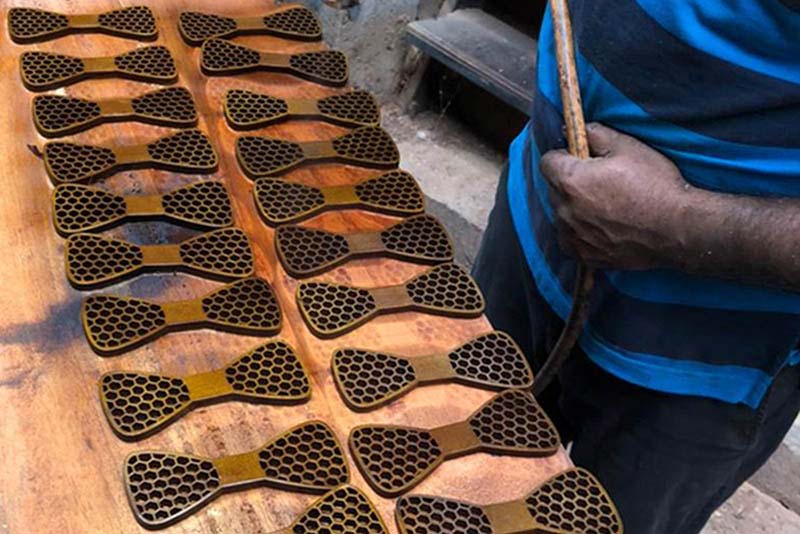By Savani Jayasooriya
COLOMBO, Sri Lanka—Every Sunday morning for as long as I can remember, my mother has headed to the nearby supermarket to get her weekly supply of veggies and fruits. Sometimes, it’s a family affair and I would tag along with my parents, too. During these visits, I’ve often watched her carefully hand-pick the best and the freshest produce.
But this was before the COVID-19 pandemic arrived in Sri Lanka in March 2020.
When the pandemic reached us, the country entered a nationwide lockdown with no end date. Everything, including marketplaces, was closed to the public. That first day before the lockdown, everything was chaotic because people had only a few hours’ notice to buy what they could. People rushed into supermarkets, traffic came to a standstill—and we realized that things were bound to be different from then on.

Savani Jayasooriya. Photo by Chamali Jayasooriya
To get a sense of how things have changed in the past year and a half, I talked to several friends and colleagues who run businesses here. Their experiences give them perceptive insights into how the pandemic has left its mark on Sri Lanka—and on young entrepreneurs.
The shock of COVID-19
My friend Janik Jayasuriya runs his family’s hotel business in Sri Lanka’s beautifully lush hill country, Nuwara Eliya, also known as “Little England.” When he looks back to the time just before the pandemic struck, he remembers that his 30 hotel employees were getting ready for April—the busiest season in Nuwara Eliya, which bustles with tourists visiting the blooming gardens and verdant tea plantations.
But as COVID-19 cases rose, Jayasuriya’s plans sunk. “Everything was closed up,” he said. “I had my entire team in Nuwara Eliya who were being paid but not having any work.”
So he thought creatively. Since the hotel owned farms that produced vegetables for its in-house supplies, “I got my team together to gather fresh produce from ours and from those nearby farms,” he said. He shuttled a few truckloads of vegetables to Colombo–the commercial capital of Sri Lanka–where fresh produce was not readily available because markets had closed. “I thought of it as a community service, given we had the resources,” said Jayasuriya.

Janik Jayasuriya, Managing Director of Celeste Daily. Photo by: Uvin Chandula
He continued this for a week, going up and down from Colombo to Nuwara Eliya–170 kilometers one-way. Jayasuriya and his team provided their fresh produce to people at low prices, covering only the transportation costs.
Starting a brand-new business
Jayasuriya soon realized that the pandemic would stay far longer than anyone anticipated. He came up with a new idea and rallied vendors and suppliers–especially those whose products were either stuck in warehouses or laying fallow in farms–and launched Celeste Daily, an online marketplace selling fresh produce in Colombo. Collaborating with ride-hailing apps like Uber and PickMe–which is IFC’s first venture capital investment in Sri Lanka–Celeste Daily delivered 300 to 400 orders per day during the first wave of the pandemic.
While ordering food online was not something new for many living in urban Colombo, getting fresh produce of vegetables and fruits delivered was. COVID-19 made us all re-examine how we get our groceries and other supplies. With restrictions on movement, urban Sri Lankans could no longer rush to supermarkets or roadside shops as needs arose.
For Jayasuriya, the shift to a new business model has not been easy. “We adapted very fast. We had a short learning curve and no margin for errors,” he said.
Jayasuriya’s creative thinking during the public health crisis has allowed him to keep his core team employed while also supporting home-based food vendors and local farmers. Now, a year since Celeste Daily was founded, it offers more than 2,000 different food and food-related products. The company’s establishment and gradual expansion assured that there was a buffer when future waves of the pandemic set in. “By the time when the second and third lockdowns came in, we were ready,” he said.
Small businesses like Celeste Daily matter in Sri Lanka, where small and medium sized enterprises (SMEs) make up a large part of the country’s economy. SMEs account for 80 percent of all businesses and contribute up to 45 percent of domestic employment and 52 percent of the country’s gross domestic product (GDP).
Those SMEs and their employees were hard-hit by COVID-19, which continues to wreak havoc across the island. According to the World Bank, Sri Lanka’s economy contracted by 3.6 percent in 2020. It’s the worst growth performance on record for the country. However, as noted by KPMG, COVID-19 lockdowns have helped accelerate the need for technology driven start-ups–like Celeste Daily. The report found that Sri Lanka saw more than 15 delivery-related start-ups emerge from the pandemic.
The show will go on
COVID-19 forced businesses to embrace technology like never before—just ask Nikeshi Caldera, who at age 25 is one of the creative minds in Sri Lanka’s event management industry. She’s the Head of Client Services at Nisal Cee Private Limited, and she told me how the pandemic made the company vault to virtual within a matter of weeks.

Nikeshi Caldera, Head of Client Services at Nisal Cee Private Limited. Photo by: Bashitha Eranga
Sri Lanka’s event management industry is a full-scale supply chain, directly employing around 30,000 people across the sector–from on-stage to off-stage. Unfortunately, within the span of a year, the industry was hit with two tragedies–a series of coordinated bombings known as the Easter Attacks in April 2019 and COVID-19 from March 2020 onwards.
“Both came as shockers and were big blows to our industry. When the first wave of COVID-19 hit us, we weren’t ready to focus on our business,” Caldera said. “We had to adapt fast. The good thing was we [already] had an idea about moving toward digital. So we had the advantage of setting the trend before anyone else did,” she said.

Behind the scenes, bringing a virtual event to life. Photo by: Bashitha Eranga
With COVID-19, most of the company’s operations became virtual–including product launches. For instance, the company launched “Headlines”–a new concept bringing together features like augmented reality and visual effects. That success with a new model encouraged clients. “This really helped us in showing the people that no matter what, the show will go on,” said Caldera.
Entrepreneurs with evolving business models
While Jayasuriya and Caldera were able to navigate their existing businesses down new paths, some struggled mightily, or shut their doors permanently. According to an IFC survey, 90 percent of Sri Lankan businesses experienced a significant drop in sales due to the pandemic.
My friend and colleague Rizwan Rizvi, the co-founder of Amberry and a Program Assistant at IFC in Colombo, suffered a heavy blow to his once-successful online business. Amberry–a pioneer in artisan-created wooden accessories such as wooden bowties and cufflinks for men–had double-digit growth every month before COVID-19. After the pandemic struck, Rizvi said that “sales were nil for three to four months,” but they couldn’t shut down their supply chains, comprised of local suppliers who were relying on them. “We averaged the past year’s contributions and paid our suppliers in advance to give them a source of an income,” he said.

Artisan wooden bow ties in the making at the Amberry workshop. Photo by: Amry Ahamed
To remain afloat, Amberry diversified its product range to include curated gift boxes and introduced digital payment mechanisms. When the second and third rounds of lockdowns came in, the company was fully prepared. “We aren’t 100 percent back, but it’s manageable,” said Rizvi. He believes that new technology will allow Amberry to survive, and he continues to think of new ways for the start-up to evolve in the context of the crisis.

Rizwan Rizvi, the co-founder of Amberry. Photo by: Amry Ahamed
Jayasuriya, Caldera, and Rizvi are examples of young entrepreneurs who kept moving forward during the pandemic, not just for their own survival but for those who depended on them. They all believed in one thing – keep your crew afloat, so all can stay afloat.
This is a good theory to live by—because with COVID-19, we all went through unimaginable changes. Most of us are working from home full time, my mother is a pro at getting her supplies online, kids of my colleagues are all studying online, and telehealth is here to stay. Things that may have taken a few years–especially digitalization of small businesses in a country that depends on small businesses–happened faster than we expected, because we all had to adapt and keep moving forward. And with another wave of the pandemic upon us, the need to innovate remains as important as ever.
Savani Jayasooriya is an IFC communications consultant based in Colombo.
Published in September 2021
